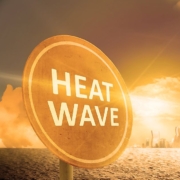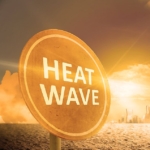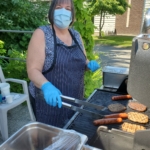Coping with extreme heat in long-term care and assisted living
What’s Happening?
- Extreme heat continues in our region with high temperatures forecast throughout the week of June 27, 2021.
- We are currently seeing a significant increase in the number of people seeking emergency care for heat-related conditions. Many people seeking care are our residents and tenants, for whom hot temperatures can be especially dangerous.
- Staff are also suffering from heat stress at some long-term care (LTC) and assisted living (AL) sites. It is imperative that heat stress prevention measures are provided for staff.
Taking Care of Yourself:
-
- Report any symptoms of heat-related illness to your supervisor as soon as possible:
- Changes in oral cavity – insufficient saliva or unusual dry mouth, difficulty speaking and/or swallowing, nausea and vomiting
- Changes in behavior – headaches, unusual fatigue, sleepiness, weakness
- Skin moisture – signs of heat rash, fungal rash
- Difficulty breathing
- Changes in level of responsiveness
- Risk factors
- Physical factors and chronic diseases, such as: heart conditions, diabetes, respiratory or renal insufficiency, Parkinson’s Disease, obesity, and skin disorders that impact sweating
- Multiple medication particularly anticholinergics, vasoconstrictors, antihistamines, diuretics, atihypertensive and psychoactive drugs
- Older adults, in particular, women over the age of 75
- Stay hydrated and cool at work and at home
- Drink water even if not thirsty
- Take cool baths or showers
- Visit your local municipality website for list of cooling centres (Abbotsford Cooling Centres) that are open in their community, especially if they are unable to adequately cool their home.
- Report any symptoms of heat-related illness to your supervisor as soon as possible:
How This May Affect You in caring for residents/tenants?
- Set-up hydration rounds and cooling-off stations – eg: applying cool water mist or wet towels prior to sitting in front of a fan as a quick way to cool off. At current temperatures, fans alone are not effective.
- Create individualized care plans to assess and treat all residents for signs, symptoms, and risk for heat-related illnesses
- Host huddles each shift to educate staff and care of residents during extreme heat
- Watch for residents/tenants at risk where special attention may be needed, including those:
- Unable to adapt behavior to keep cool, eg – those with cognitive losses or immobility
- With physical factors and chronic diseases, such as; heart conditions, diabetes, respiratory or renal insufficiency, Parkinson’s Disease, obesity, and skin disorders that impact sweating
- On multiple medications particularly anticholinergics, vasoconstrictors, antihistamines, diuretics, antihypertensive and psychoactive drugs
- Who are older (especially women over 75 years old)
- Watch for signs and symptoms of heat stress, including:
- Decreased fluid intake or thirst
- Changes in behavior – headaches, unusual fatigue, sleepiness, weakness
- Skin moisture – signs of heat rash, fungal rash
- Difficulty breathing
- Changes in level of responsiveness
- Changes in oral cavity – insufficient saliva or unusual dry mouth, difficulty speaking and/or swallowing, nausea and vomiting
Prevent and manage heat stress by:
- Cooling-off strategies:
- Use cool clots for face and hands, and/or back of neck
- Consider loosely applying wet sheets to the body and reapply Q10-15 minutes
- Regularly misting residents
- Provide an additional shower or bath
- Have residents wear lightweight clotting and/or coverings
- Relocate resident to a cooler location if possible during the day or periods of the day. If common areas are on main floor and cooler rotate and schedule residents to this area
- If going outside is a must for residents, have them wear sun protection, hat and sunglasses and encourage them to stay in the shade
- Hydration strategies:
- Provide additional cool fluids and foods high in water content such as fruits and salads
- Provide ice cubes and popsicles to help with fluid intake
- Proactively offer hydration during medication administration and during daily care – ie: AM care, PM care
- Have family and visitors provide additional support needed for hydration rounds and cooling stations
- Have HCAs report any signs or symptoms of dehydration to the nurses, as soon as possible





